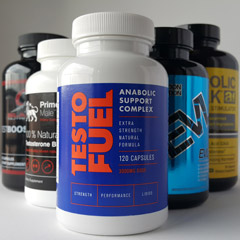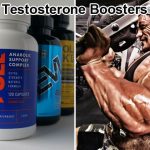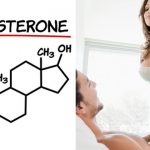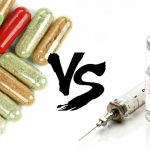
It is said that men with low levels of testosterone are more likely to get married as women subconsciously see them as better father material.
This is not a reason to want a low testosterone level; in fact too much testosterone has been linked to testicular shrinkage.
It should be noted that this is usually a result of anabolic steroid abuse making the testicles redundant.
Why Is Low Testosterone An Issue?
 Testosterone is an important part of the human body, both male and female.
Testosterone is an important part of the human body, both male and female.
It is produced in childhood but the amount of it in your body accelerates dramatically once you reach puberty.
Unfortunately it starts to naturally decline once you hit 30. Maintaining a reasonable level of testosterone is essential to your general good health.
Although the stimulation of protein synthesis it is instrumental in the muscle building process.
But testosterone is also necessary to ensure you maintain healthy organs, prevent circulatory issues and ward off disease as you age.[1]
Although low testosterone levels are associated with older men this does not mean you cannot have low testosterone when you are younger.
You simply need to have a testosterone level consistently below the accepted norm for your age.
Optimal levels are also vital for maximal muscle gains and peak athletic performance.
Causes of Low Testosterone

There are several reasons why you may have low levels of testosterone.
This is an androgen deficiency which is also known as hypoandrogenism and can generally be attributed to either a primary mechanism or a secondary one:
Primary Mechanisms
This covers all issues which result from a problem in your testes.
Any physical defect or disease can prevent your testes from producing testosterone or simply lower their efficiency at producing it.
Common causes in this category include Addison’s disease, kidney disorder, autoimmune illnesses and undescended testicles.
Your brain is telling your testes to produce the hormone but they are incapable of producing it.
Secondary Mechanisms
In contrast if your testes are capable but your brain is not telling them to make any testosterone then you will still suffer from low testosterone.
This is often a result of inflammatory diseases which clog the message highways inside your body. It can also be caused by rapid weight loss, obesity and a variety of tumors or similar disorders.
It has been established that low testosterone levels are present in 38.7% of males over 45 and that the risk levels increase by 17% every ten years after this age.[2]
This survey was conducted using men over 45 who had visited their doctor in the last two weeks (for any reason). There were 2,000 men consulted via a blood sample and a written assessment.
The Symptoms
There are many symptoms associated with low T levels, but here are the main ones to watch for.
While you may not have all of them if you have several of the following it may be time to see your health professional for blood tests.
Optimal testosterone levels will improve your overall health and lifestyle but you may also be surprised at how well your strength, muscle mass and fat loss increases.
1. Libido

It should come as no surprise that the male sex hormone is linked with your sex drive.
Low levels of testosterone have been shown to make you the one saying no. Your lady no longer needs to pretend to have a headache.
A long term study followed 1632 men measuring their testosterone levels and libido over a 15 year period.
It concluded that low libido is directly linked with low testosterone although this information is of limited use in individual cases.[3]
2. Depression

A study of 278 men aged 45 and older was conducted over a 2 year period.[4]
It demonstrated that men with low testosterone levels are more likely to feel depressed and suffer from anxiety issues.
In fact, 21.7% of men with low T were likely to become depressed as opposed to just 7.1% of those with normal T levels.
Becoming anxious, experiencing mood swings or depressed feelings is something you need to have checked.
3. Irritable

The exact link between low T and irritability is hard to define but it is potentially a result of the hormone changes in your body and your frustration with the way you have changed.
It’s often noticeable by a change in your behavior, your loved ones will know there is something wrong even though you say you are fine.
4. Loss of Muscle

This is a particularly frustrating symptom of low testosterone.
The male hormone is responsible for protein synthesis; the process by which your muscles heal and grow stronger after you have pushed them to their limits.
Without enough testosterone in your body the muscles will be unable to grow, no matter how hard you workout. You may notice shrinkage in your arm and leg muscles or simply feel weaker.
Either way you need to do something about it.
5. Fat Gain

In conjunction with an inability to grow muscle you will find that you are accumulating additional fat stores; particularly around your waist.
This is a chemical process in the body. Lower amounts of testosterone encourage the metabolism to slow down. Unless you cut your eating this means you will consume more calories than you need.
Excess calories are stored as fat. To compound this fat cells release estrogen, the female hormone. This converts testosterone into more estrogen, encouraging the fat building process and increasing your levels of estrogen.
You may find that you start to develop gynecomastia; male breasts.
6. Weaker Bones

Despite what you may have thought bones are actually tissues and constantly replenish themselves.
This is how they are able to stay healthy and even grow stronger.
Studies show that low testosterone levels are linked with weaker bones; particularly as you age.[5] This will reduce the amount you can lift, increase the likelihood of injury and can even cause mobility issues.
7. Concentration & Memory Issues

Surprisingly low testosterone levels are also linked with a reduction in ability to concentrate and will affect your ability to remember things. It has even been linked with Alzheimer’s disease.[6]
8. Erectile Dysfunction

If having a low libido was not enough low levels of the male sex hormone are also displayed through an inability to get an erection.
Testosterone is not what causes an erection but its presence in your body does tell the brain to produce nitric oxide; which is essential for an erection to occur.
This is a symptom of low testosterone but there are several other factors involved in this process, increasing testosterone levels will benefit your ability to obtain an erection but may not resolve the issue by itself.
9. Genital Numbness

Although this is not something that every man will complain of.
In many cases men will state that they do not have the same sensations when touching or being touched on their genitalia.
Although not a complete numbness there is a lack of pleasure associated with touch. While many sufferers report this symptom there has not yet been any significant research to confirm this.
10. Tiredness

If you’re feeling tired all the time you may think it is because you are working hard, looking after the family and still finding time to hit the gym.
However, tiredness is also a common sign of low testosterone levels. This is despite getting a good night’s sleep and wanting to do things; you just don’t have the physical energy.
11. Penis Shrinkage

An alarming symptom of low male hormone level is shrinkage in your penis as well as your testicles!
This is basically linked with the theory of ‘use it or lose it’. If your body is not producing enough testosterone the tissues in your genitals will simply shrivel up actually causing shrinkage to your penis.
You may think you are imagining it but it is worth checking it out.
12. Hair Loss

This is a difficult one to attribute solely to low T levels.
Balding is actually a common part of aging. However, hair loss is also a symptom of low testosterone.
If your family history does not include baldness but you are going bald it is worth having your testosterone levels checked.
Research shows that testosterone is converted to DHT by 5 alpha reductase and that there are higher levels of this in men with hair loss. Blocking this conversion reduces the rate of hair loss.
This would suggest that low levels of testosterone decrease hair loss. However the studies also show that hair loss is linked with androgen sensitivity; which is increased by low testosterone levels.[7]
What Is The Solution?
Combating low testosterone levels is possible; you simply need to apply one or all of these methods:
Dietary Changes

You can boost your production of testosterone naturally by making sure you eat foods high in zinc, magnesium and vitamins D. Oysters are one of the best examples.
These nutrients will fuel the natural processes in your body telling your body to produce more testosterone.
Of course a healthy balance of fats, carbohydrates and protein is also essential to ensure your body has all the fuel it needs.
Natural T-Boosters

These natural and highly effective products can be used instead of locating some of the right food supplements.
After all, eating oysters everyday can be tiresome and awkward; as well as expensive.
A good T-Booster should contain zinc, magnesium, d-aspartic acid, a variety of vitamins and a selection of other ingredients to boost your testosterone levels through your body’s natural processes.
It is important to note that these do not add testosterone to your body, but they do encourage your body to make more testosterone by itself; similar to the way that eating the right food does.
Effective T boosters have been clinically proven to give men optimal testosterone levels.
Reduce Stress

Your body responds to stressful situations by releasing the hormone cortisol.
This prepares you to take action but temporarily reduces the creation of several hormones, including testosterone.
If you are stressed for a lot of the time your testosterone levels will fall. Combat this by avoiding stressful situations where possible.
Exercise

Exercise, especially strength training is known to increase the level of testosterone in your body; possibly by reducing the fat build up and estrogen in your body.
Lifting weights, strength training and HIIT (high-intensity interval training) is one of the best way to achieve long term, consistent results.[8]
Summary
If you are displaying any of these symptoms you owe it to yourself to try boosting your testosterone through one of the natural processes described above.
You will notice the difference in your lifting ability, energy levels, mood and the improved sex drive can just be called a bonus!
Find out for yourself the top 5 natural T-boosters currently available on the market right now.
These are the best choices if you want to...
- Build Muscle Quickly
- Rapid Strength & Size Increases
- Promote Fat Loss
- Increase Energy
- Enhance Sex Drive
Click Here to See the Full List!
References & Studies
[1] https://www.ncbi.nlm.nih.gov/pubmed/19011291
[2] https://www.ncbi.nlm.nih.gov/pmc/articles/PMC1569444/
[3] https://www.ncbi.nlm.nih.gov/pubmed/16670164
[4] https://www.ncbi.nlm.nih.gov/pubmed/14757592
[5] https://www.ncbi.nlm.nih.gov/pmc/articles/PMC5036835/
[6] https://www.ncbi.nlm.nih.gov/pubmed/26154489
[7] https://www.ncbi.nlm.nih.gov/pmc/articles/PMC4174066/
[8] https://www.ncbi.nlm.nih.gov/pubmed/22234399









Leave a Reply